
Featured Blog | This community-written post highlights the best of what the game industry has to offer. Read more like it on the Game Developer Blogs or learn how to Submit Your Own Blog Post
Can Political Games Change the World
Squeaky Wheel co-founder Ryan Sumo talks about some of his favorite political games and whether or not he thinks they can change the world.

A couple of weeks ago, I did a Rezzed Developer Sessions talk at EGX entitled “Can Political Games Change the World?” Apart from doing the talk, it was also the first time we showed the official trailer for Political Animals, seen above. Unfortunately there wasn’t any video coverage, although any coverage would probably have been marred by the fact that there was a Destiny shoutcaster literally yelling “DESTINY! DESTINY! DESTINY!” and throwing out swag to cheering crowds every fine minutes of the talk. In lieu of that, I thought it might be interesting to show my slides here with some notes to give you a flavor of what the talk was like.
Slide 1: “Can Political Games Change the World?”
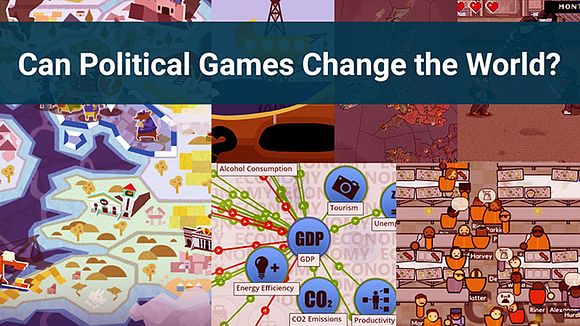
Here I introduce myself and give the flow of the talk, which is to look at six political games along a spectrum and discuss how I think they have an impact on the world.
Slide 2 : Definition of Political Games
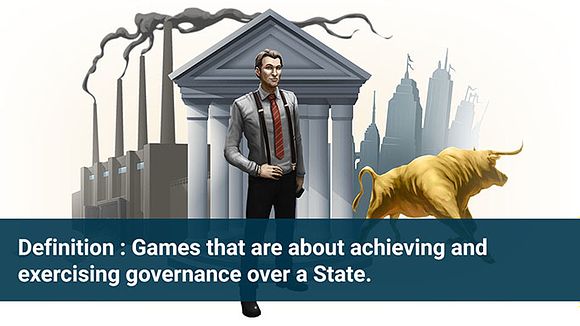
Here I address how the term “political games” can mean several different things, but for the purposes of the talk I've defined them as games that are about achieving and exercising positions of governance over a community, particularly a state.
Slide 3 : Spectrum of Games
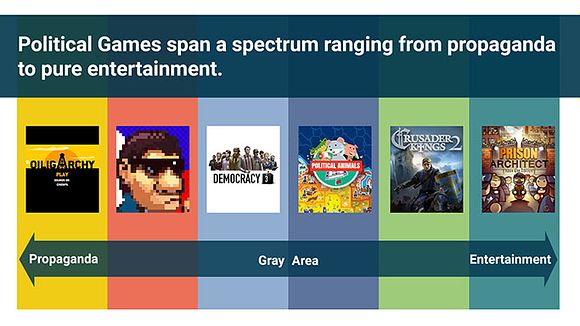
Political games span a spectrum ranging from propaganda to pure entertainment. Essentially rehash slide 1, but now with a visual of the spectrum of political games. The next slide is when we get to the meat of things.
Slide 4 : Oiligarchy
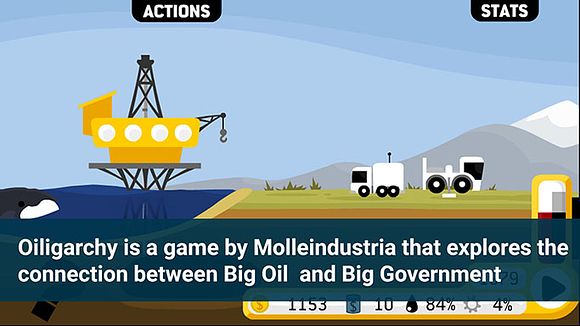
Oiligarchy is a game by Molleindustria that explores the connection between Big Oil and Big Government. It’s a management game where you explore and drill for oil wells, destroying environments and communities along the way. You contribute money to Big Government by literally throwing money at them and “oiling” government representatives. If you manage to “oil” the president, it gives you access to the secret room, which allows you to do things like destabilize Iraq in order to obtain access to its oil profits.
It’s a really intriguing and pretty game, as are all of Molleindustria’s titles. However, the fact that it is clearly propaganda has a noticeable effect on the game design. It’s super simplistic, and there isn’t much challenge to searching for and drilling oil wells. Perhaps the lack of challenge is a commentary on how easy it is to run an oil company, but the game becomes very tedious after 15 minutes or so due to a lack of depth.
The game sacrifices good design in order to make a heavy-handed point, i.e. oil companies are evil. I suspect this also means that it preaches to the choir and doesn’t really do a good job of changing people’s minds or even opening up a conversation about oil.
Slide 5 : Rody Fight Duterte for Change
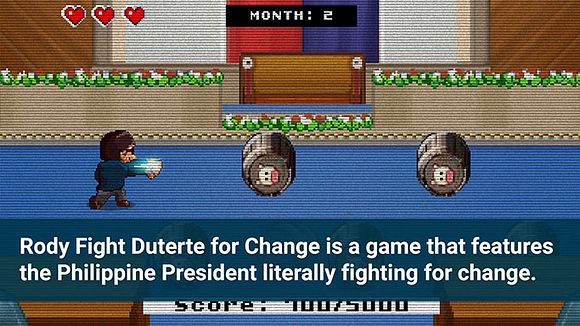
Rody Fight Duterte for Change is a minigame collection on mobile byKeybol Games that features a presidential candidate literally fighting for change. It’s an Android minigame collection that was released to coincide with the Philippine elections. It straddles a moral gray area and caused a kerfuffle in the local game dev community because while it doesn't explicitly promote the candidate it quotes the candidate throughout the game and portrays the candidate in a heroic light. Our election laws are too antiquated to handle questions about game as propaganda. Keybol is a well known game dev locally and there are some brilliant moments in the game when I laughed out loud, such as the minigame where the candidate is literally punching red tape to death.
Given the fractious nature of the most recent Philippine elections, it’s hard to say whether this game really had any impact on changing voters’ minds. It could be argued that the developer was also taking advantage of the popularity of the candidate (now president) , especially given the information in my next slide.
Slide 6 : Screenshot of additional Duterte Games
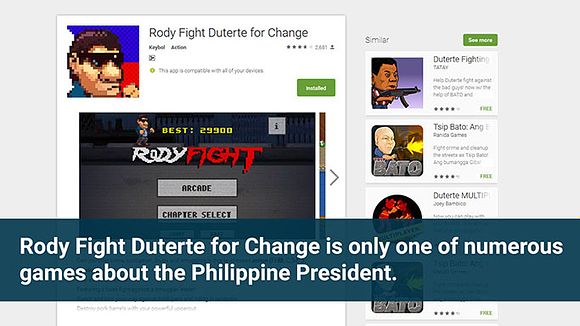
The Philippine president seems tailor-made for mobile games, and even his chief of police has a game made about him. Obviously given his popularity games made about the president are likely to do well locally.
Slide 7 : Democracy 3
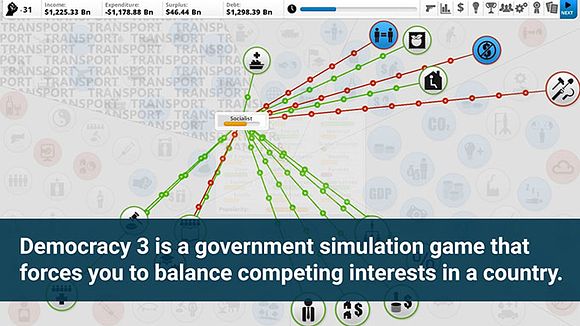
Caveat : the creator of Democracy 3 is our publisher so take what I say here with a grain of salt.
Political philosopher and economist Thomas Sowell once wrote that “There are no solutions, only tradeoffs”. The Democracy series of simulation games is the embodiment of this idea. It shows you how policies result in different outcomes across different sections of the population and challenges you to balance these competing interests in your country. The way it abstracts political horse trading into political capital is also a stroke of genius.
At times, however, it suffers from feeling too efficient. Democracy 3 is almost a Utopian vision from a programmer about how governance “ought to be”. Government should logically weigh the pros and cons of a policy and make exact calculations about how to bring about the greatest overall benefit for the most number of people. But people aren’t rational and logical. People are emotional and inconsistent, capable of holding two contradictory points of view at the same time.
Still, it’s a useful teaching tool, and Democracy 3 has already been used at a European Youth Event for young political leaders. It's interesting to note that it’s being downloaded and played in China, where there is a one party system.
Slide 8 : Crusader Kings 2
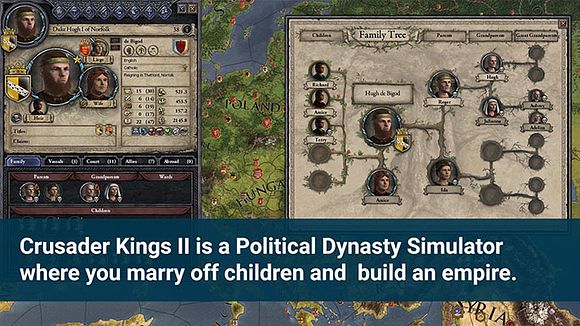
As a child of a once-colonized country I was basically taught that Kings and Queens ruled absolutely and did as they pleased. This was reinforced by Games like Civilization and Total War, which essentially cast you as an absolute dictator with the sole decision making power over what to build, who to war with, etc. CK2 forces you to negotiate that power structure with the nobles who swear fealty to you. You cannot commit to a war for no reason, and if you do end up going to war your nobles are only obliged to send a certain percentage of their fighting men to you. While governments have certainly evolved (and sometimes devolved) over time, CK2 taught me that governance has and always will be about how society negotiates power with its leaders.
Crusader Kings 2 has no illusions about changing the world, but it certainly broadened my perspective about history and governance in a way that few games ever have.
Slide 9 : Prison Architect
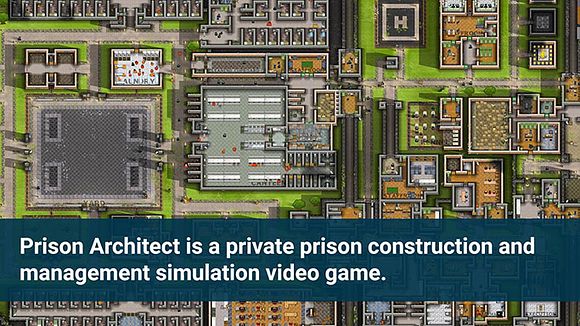
Another caveat : I was the artist of Prison Architect, so obviously I am rather biased towards it.
Prison Architect is the least overtly political game, but touches on a very political topic, which is for-profit prisons. Interestingly, it wascritiqued by Paolo Pedercini of Molleindustria on the political ramifications of making a game about prisons, which in a way brings the spectrum of political games full circle.
Prison Architect makes no pretension about being a political game. It touches lightly on some political themes in its tutorial, but it makes a clear point of allowing the player to build a socialist utopia or an authoritarian gulag without ever penalizing them for either choice.
Prison Architect never aimed to change the world, but it did give people a way to interact with a social issue in a way that they never would have been able to before. I would also argue that because it wasn't propaganda it reached a much broader and wider audience, which is shown by these articles from Atlantic and Mother Jones.
Slide 10 and 11 : Lame Answers to Important Questions
Essentially these slides were used to re-ask the original question “Can Political Games Change the World?” and offer my profound answer, “Maybe.” I feel it’s too hard to say one way or the other, and creating change in the world is too much to ask of one game. At best, political games can and should challenge us as individuals and open us up to different ideas. Which then leads us neatly to Political Animals.
Slide 12-16 : Political Animals
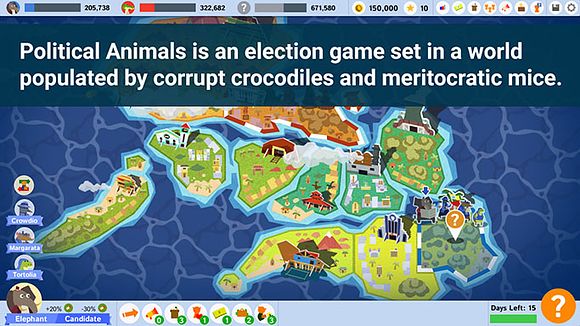
Slides 12-16 for the most part describe Political Animals , which is probably something best served by going to the game’s website.
At this point I'd like to go a little more in depth about the more high-minded goals of Political Animals.
The common argument put forth when discussing politics is that all we need are “good people”. If only we had “good people” who weren’t “corrupt” we would have an excellent working government. Yet time and again it seems we elect “corrupt” officials. Why is that? Are we just so unlucky that we live in countries where only bad politicians thrive?
We put forth the argument that bad systems make for bad politicians. If we had better systems in place that encouraged good behavior, we would generally produce better politicians who serve the interests of their people.
We want to throw the player into the election campaign as we currently see it, with the countless interests that constantly compete for your campaign funds. We challenge the player to weigh pragmatic results against tough moral choices. And at the end of the day we ask the player what every politician at some point will have to ask themselves: What are they willing to pay in order to ensure victory?
Will Political Animals change the world, or even our country? Probably not. But we want people to question themselves. We want people to ask if they really would do a better job than their politicians. And we want them to come to the realization that politicians are just like them, just flawed human beings working in a bad system. We want them to think about how to fix that system, because we have no answers.
And as if we weren’t setting the bar high enough for ourselves, we want them to enjoy playing our political strategy game at the same time.
Thanks for reading! Political Animals is launching soon, and if you'd like to be updated on the latest Political Animals news, please sign up for our mailing list, join our Facebook group, or follow us on Twitter!
Read more about:
Featured BlogsAbout the Author(s)
You May Also Like







.jpeg?width=700&auto=webp&quality=80&disable=upscale)








